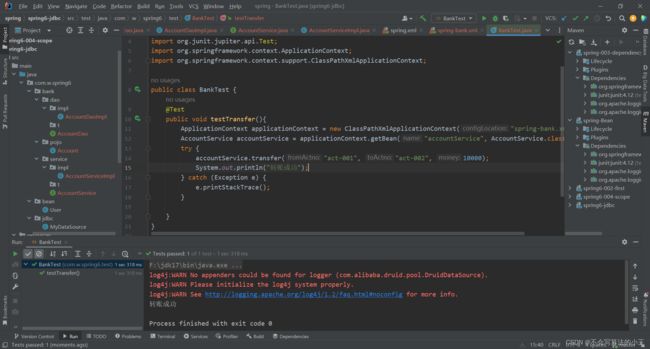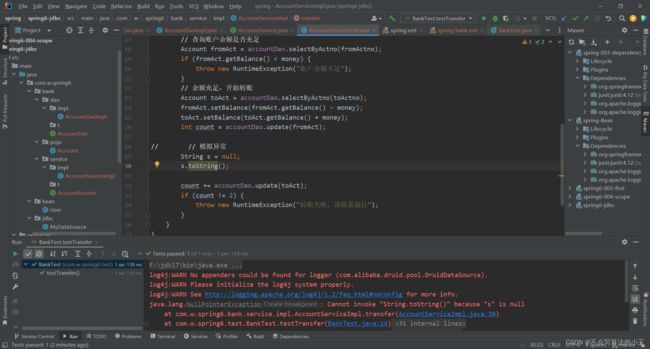Spring对事务的实现
Spring对事务的支持
- 事务概述
-
- 事务的四个处理过程
- 事务的四个特性
- 引入事务场景
- Spring实现事务的两种方式
-
- 声明式事务之注解实现方式
事务概述
- 在一个业务流程当中,通常需要多条DML(insert delete update)语句共同联合才能完成,这多条DML语句必须同时成功,或者同时失败,这样才能保证数据的安全。
- 多条DML要么同时成功,要么同时失败,这叫做事务。
事务的四个处理过程
第一步:开启事务 (start transaction)
第二步:执行核心业务代码
第三步:提交事务(如果核心业务处理过程中没有出现异常)
第四步:回滚事务(如果核心业务处理过程中出现异常)
事务的四个特性
原子性:事务是最小的工作单元,不可再分。
一致性:事务要求要么同时成功,要么同时失败。事务前和事务后的总量不变。
隔离性:事务和事务之间因为有隔离性,才可以保证互不干扰。
持久性:持久性是事务结束的标志。
引入事务场景
例:两个账户act-001和act-002。act-001账户向act-002账户转账10000,必须同时成功,或者同时失败。
新建模块:spring6-jdbc
连接数据库的技术采用Spring框架的JdbcTemplate
pom.xml
<project xmlns="http://maven.apache.org/POM/4.0.0"
xmlns:xsi="http://www.w3.org/2001/XMLSchema-instance"
xsi:schemaLocation="http://maven.apache.org/POM/4.0.0 http://maven.apache.org/xsd/maven-4.0.0.xsd">
<modelVersion>4.0.0modelVersion>
<groupId>com.wgroupId>
<artifactId>spring6-jdbcartifactId>
<version>1.0-SNAPSHOTversion>
<repositories>
<repository>
<id>repository.spring.milestoneid>
<name>Spring Milestone Repositoryname>
<url>https://repo.spring.io/milestoneurl>
repository>
repositories>
<dependencies>
<dependency>
<groupId>org.springframeworkgroupId>
<artifactId>spring-contextartifactId>
<version>6.0.0-M2version>
dependency>
<dependency>
<groupId>junitgroupId>
<artifactId>junitartifactId>
<version>4.13.2version>
<scope>testscope>
dependency>
<dependency>
<groupId>mysqlgroupId>
<artifactId>mysql-connector-javaartifactId>
<version>8.0.30version>
dependency>
<dependency>
<groupId>org.springframeworkgroupId>
<artifactId>spring-jdbcartifactId>
<version>6.0.0-M2version>
dependency>
<dependency>
<groupId>jakarta.annotationgroupId>
<artifactId>jakarta.annotation-apiartifactId>
<version>2.1.1version>
dependency>
<dependency>
<groupId>org.junit.jupitergroupId>
<artifactId>junit-jupiterartifactId>
<version>RELEASEversion>
<scope>testscope>
dependency>
<dependency>
<groupId>com.alibabagroupId>
<artifactId>druidartifactId>
<version>1.1.8version>
dependency>
dependencies>
<properties>
<maven.compiler.source>17maven.compiler.source>
<maven.compiler.target>17maven.compiler.target>
properties>
project>
第一步:准备数据库表
t_act
表结构

表数据

第二步:创建包结构
com.w.spring6.bank.pojo
com.w.spring6.bank.service
com.w.spring6.bank.service.impl
com.w.spring6.bank.dao
com.w.spring6.bank.dao.impl
第三步:准备POJO类
Account.java
package com.w.spring6.bank.pojo;
public class Account {
private String actno;
private Double balance;
@Override
public String toString() {
return "Account{" +
"actno='" + actno + '\'' +
", balance=" + balance +
'}';
}
public Account() {
}
public Account(String actno, Double balance) {
this.actno = actno;
this.balance = balance;
}
public String getActno() {
return actno;
}
public void setActno(String actno) {
this.actno = actno;
}
public Double getBalance() {
return balance;
}
public void setBalance(Double balance) {
this.balance = balance;
}
}
第四步:编写持久层
AccountDao接口
package com.w.spring6.bank.dao;
import com.w.spring6.bank.pojo.Account;
public interface AccountDao {
/**
* 根据账号查询余额
* @param actno
* @return
*/
Account selectByActno(String actno);
/**
* 更新账户
* @param act
* @return
*/
int update(Account act);
}
AccountDaoImpl.java
package com.w.spring6.bank.dao.impl;
import com.w.spring6.bank.dao.AccountDao;
import com.w.spring6.bank.pojo.Account;
import jakarta.annotation.Resource;
import org.springframework.jdbc.core.BeanPropertyRowMapper;
import org.springframework.jdbc.core.JdbcTemplate;
import org.springframework.stereotype.Repository;
@Repository("accountDao")
public class AccountDaoImpl implements AccountDao {
@Resource(name = "jdbcTemplate")
private JdbcTemplate jdbcTemplate;
@Override
public Account selectByActno(String actno) {
String sql = "select actno, balance from t_act where actno = ?";
Account account = jdbcTemplate.queryForObject(sql, new BeanPropertyRowMapper<>(Account.class), actno);
return account;
}
@Override
public int update(Account act) {
String sql = "update t_act set balance = ? where actno = ?";
int count = jdbcTemplate.update(sql, act.getBalance(), act.getActno());
return count;
}
}
第五步:编写业务层
AccountService接口
package com.w.spring6.bank.service;
public interface AccountService {
/**
* 转账
* @param fromActno
* @param toActno
* @param money
*/
void transfer(String fromActno, String toActno, double money);
}
AccountServiceImpl.java
package com.w.spring6.bank.service.impl;
import com.w.spring6.bank.dao.AccountDao;
import com.w.spring6.bank.pojo.Account;
import com.w.spring6.bank.service.AccountService;
import jakarta.annotation.Resource;
import org.springframework.stereotype.Service;
@Service("accountService")
public class AccountServiceImpl implements AccountService {
@Resource(name = "accountDao")
private AccountDao accountDao;
@Override
public void transfer(String fromActno, String toActno, double money) {
// 查询账户余额是否充足
Account fromAct = accountDao.selectByActno(fromActno);
if (fromAct.getBalance() < money) {
throw new RuntimeException("账户余额不足");
}
// 余额充足,开始转账
Account toAct = accountDao.selectByActno(toActno);
fromAct.setBalance(fromAct.getBalance() - money);
toAct.setBalance(toAct.getBalance() + money);
int count = accountDao.update(fromAct);
count += accountDao.update(toAct);
if (count != 2) {
throw new RuntimeException("转账失败,请联系银行");
}
}
}
第六步:编写Spring配置文件
Spring-bank.xml
<beans xmlns="http://www.springframework.org/schema/beans"
xmlns:xsi="http://www.w3.org/2001/XMLSchema-instance"
xmlns:context="http://www.springframework.org/schema/context"
xsi:schemaLocation="http://www.springframework.org/schema/beans http://www.springframework.org/schema/beans/spring-beans.xsd http://www.springframework.org/schema/context https://www.springframework.org/schema/context/spring-context.xsd">
<context:component-scan base-package="com.w.spring6.bank"/>
<bean id="dataSource" class="com.alibaba.druid.pool.DruidDataSource">
<property name="driverClassName" value="com.mysql.cj.jdbc.Driver"/>
<property name="url" value="jdbc:mysql://localhost:3307/idea-spring-test"/>
<property name="username" value="root"/>
<property name="password" value="123456"/>
bean>
<bean id="jdbcTemplate" class="org.springframework.jdbc.core.JdbcTemplate">
<property name="dataSource" ref="dataSource"/>
bean>
beans>
第七步:编写表示层(测试程序)
BankTest.java
package com.w.spring6.test;
import com.w.spring6.bank.service.AccountService;
import org.junit.jupiter.api.Test;
import org.springframework.context.ApplicationContext;
import org.springframework.context.support.ClassPathXmlApplicationContext;
public class BankTest {
@Test
public void testTransfer(){
ApplicationContext applicationContext = new ClassPathXmlApplicationContext("spring.xml");
AccountService accountService = applicationContext.getBean("accountService", AccountService.class);
try {
accountService.transfer("act-001", "act-002", 10000);
System.out.println("转账成功");
} catch (Exception e) {
e.printStackTrace();
}
}
}
Spring实现事务的两种方式
- 编程式事务:通过编写代码的方式来实现事务的管理。
- 声明式事务:基于注解方式,基于XML配置方式
声明式事务之注解实现方式
第一步:在spring配置文件中配置事务管理器。
spring-bank.xml
<bean id="transactionManager" class="org.springframework.jdbc.datasource.DataSourceTransactionManager">
<property name="dataSource" ref="dataSource"/>
bean>
第二步:在spring配置文件中引入tx命名空间,在spring配置文件中配置“事务注解驱动器”,开始注解的方式控制事务。
第三步:在service类上或方法上添加@Transactional注解
@Transactional
public class AccountServiceImpl implements AccountService {
}




